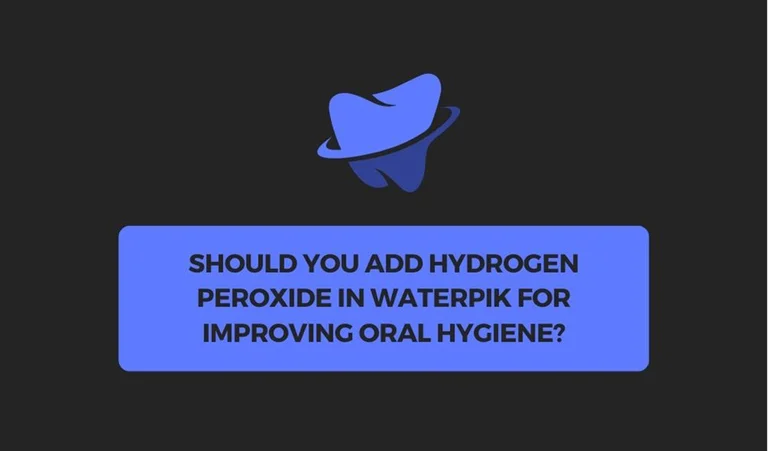Hydrogen peroxide in Waterpik is used by many people during flossing due to its antibacterial and antimicrobial properties. By following proper dilution and limited use you will have a cleaner and fresher smile.
Hydrogen peroxide is a mild antiseptic that has been used for decades to prevent infections in minor cuts and wounds. In oral care, it is used as a mouthwash for anti-bacterial properties and healthier gums. By taking a few minutes each day to floss, you are investing in the longevity and vibrancy of your smile.
The Antimicrobial Properties of Hydrogen Peroxide
Hydrogen peroxide has antimicrobial properties which make it suitable for flossing as it can keep oral region and gum healthy. It has ability to dislocate and destroy the bacterial biofilm on teeth. This compound will release oxygen creating an environment hostile to the bacteria.
Hydrogen peroxide decreases the microbial presence in the oral cavity. The oxygen released by hydrogen peroxide acts as a powerful agent breaking down the slimy plaque film. It also prevents the advancement of gum disease and maintains oral hygiene.
Solution of Hydrogen Peroxide in Waterpik
The hydrogen peroxide solution in your Waterpik can be an effective defense against the biofilm of bacteria accumulates on your teeth contributing to issues like gum disease and plaque. As the solution releases oxygen, it actively works to destroy bacteria creating a cleaner and healthier oral region or cavity.
A recommended mixture is 3% of hydrogen peroxide and water. This dilution ensures the solution’s effectiveness while reducing the risk of irritation or sensitivity. Despite the fact that the antimicrobial benefits are substantial, moderation is key.
Limit use to a once or twice a week to prevent potential irritation. Discontinue use to any signs of sensitivity or if you feel pain or irritation. Consult with your dentist before using this solution in flossing.
Why should you Floss?
Many people think brushing is effective for cleaning the surfaces of teeth, so why should one bother to do flossing. Yes, brushing cleans the teeth but falls short in reaching the tight spaces between teeth and along the gumline. Flossing can access these hard-to-reach areas preventing the accumulation of plaque and bacteria in these spaces.
These spaces between our teeth are a breeding ground for plaque. Plaque is a sticky film of bacteria that can cause gum disease if not cleaned. Flossing removes this plaque and preserves the health of our gums and prevents inflammation and bleeding.
The accumulation of plaque will not only vulnerable gum but also forms cavities. By flossing regularly, you will have a robust defense against cavities so that bacteria and debris are removed.
Flossing isn’t just about preventing cavities; it can also combat bad breath. The removal of trapped food particles and bacteria between teeth considerably adds to maintaining fresh breath.
Gum disease, if left untreated will progress to periodontal disease leading to tooth loss and other health complications. Regular flossing will inhibit the development and progression of periodontal disease.
Hydrogen Peroxide in Waterpik: Avoid Ingestion and Irritation
Hydrogen peroxide is mainly known for its antibacterial properties. Incorporating Hydrogen Peroxide can uplift your oral care routine. The solution of Hydrogen Peroxide targets bacteria and biofilm and destroys them so that you can have a healthy smile.
But be careful because hydrogen peroxide can be safe for oral use but swallowing will cause you potential harm. When you are using a hydrogen peroxide solution in your Waterpik, make sure to have a thorough rinsing and spitting. It will prevent the solution from entering the digestive system making sure its benefits are confined to the oral cavity.
Oral Sensitivity and Hygiene
If you have sensitivity in tooth, it’s better to avoid using hydrogen peroxide in flossing as it is a pretty strong solution. Choose a toothbrush with soft bristles to avoid abrasive brushing because it can cause enamel wear and gum recession.
Brush your teeth using a gentle, circular or back-and-forth motion. Do not brush aggressively as it can dcay tooth enamel and cause sensitivity.
Use toothpaste specifically made for sensitive teeth because these toothpaste typically contain desensitizing agents that help alleviate sensitivity over time.
Eat a balanced diet rich in calcium and vitamin D which are important for maintaining strong teeth and bones. Drinking water maintains saliva and saliva helps neutralize acids and strengthen enamel.
Wrap up
Hydrogen peroxide in Waterpik should be used responsibly as ingestion can be quite harmful. You have to have a balanced oral care routine that includes other methods such as brushing, flossing and regular dental check-ups also.
If you experience any adverse effects for Hydrogen peroxide discontinue immediately and consult with your dentist promptly. Regular flossing is also as important as brushing. Besides it can prevent the development and progression of periodontal disease.
FAQ
The standard concentration of hydrogen peroxide typically available in stores and to use in waterpik is 3%. You can dilute it more as a precaution. After flossing with the solution, spit it out into the sink. Do not swallow the solution.
Mix around one teaspoon of salt with one cup (8 ounces) of hand-hot water. The suggested concentration for a saline solution is normally around 0.9% (normal saline). start with a lower concentration as a precaution.
Many people use Diluted household Chloride bleach (Sodium Hypochlorite) in waterpik as it can be beneficial for oral health. It prevents cavities and keeps the gum healthy but be careful as it is a strong chemical and not meant to be ingested.
Hydrogen peroxide has antiseptic properties and can reduce stains of teeth. But you need to be vigilant because consuming undiluted or highly concentrated hydrogen peroxide on dental floss will cause irritation or damage to oral tissues.
Yes, hydrogen peroxide can be used as a mouthwash when done properly and in moderation. It has anti-bacterial properties. Swish it around your mouth for about 30 seconds and then spit it out.

